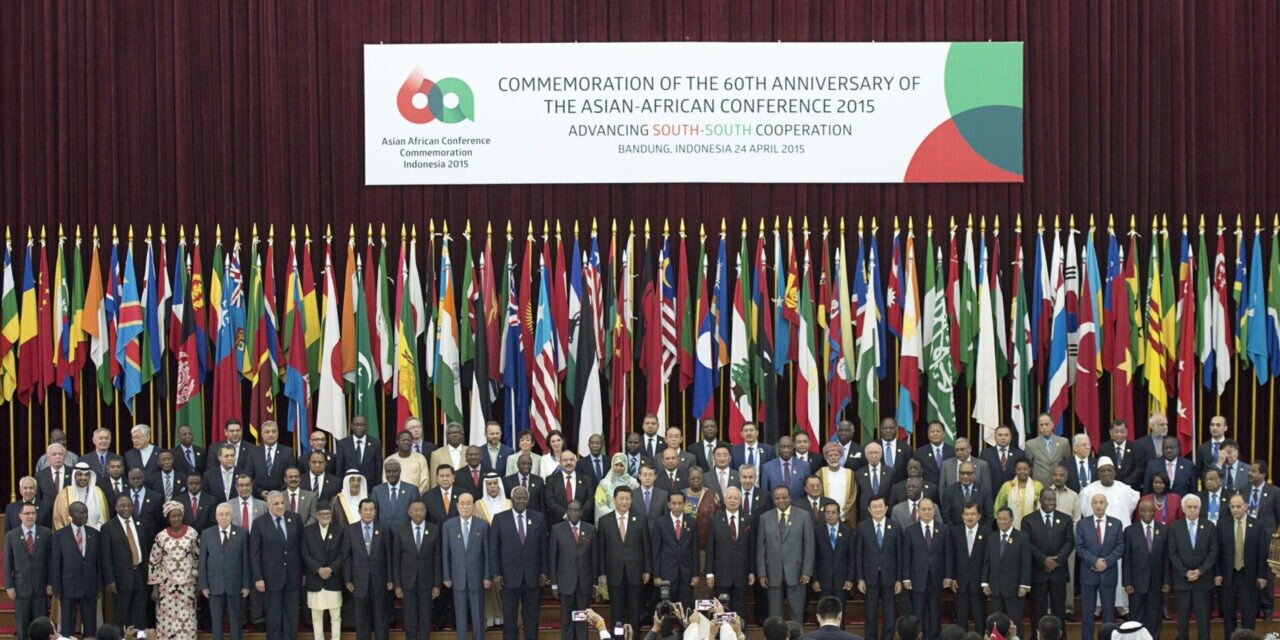The contemporary value of the Bandung Spirit

Seventy years have passed since the Bandung Conference (Asian-African Conference) was held in Bandung, Indonesia, in 1955. Although the world has experienced many major changes in its order and pattern, the spiritual values represented by the Bandung Conference remain a precious treasure of political consensus in the history of mankind.
At a time when the world is facing a potentially growing threats of isolated neo-economic nationalism and extreme unilateral hegemony, looking back at the Bandung Conference, the spirit of the Bandung Conference, which represents the philosophy and determination of Asian and African countries to work together in safeguarding peace and to collaborate in the pursuit of sustainable development, can continue to inspire the hearts and minds of all people today.
Self-reliance, self-strengthening and defiance of hegemonic power
The convening of the Bandung Conference signaled a fierce farewell to the era of colonialism for the emerging Asian and African nation states. In the 1970s, when world politics was still clouded by the shadow of the bipolar Cold War, a vast number of Asian and African countries faced pressures and threats from powerful hegemonic countries. The Bandung Conference was a milestone of self-determination and self-reliance forged in the diplomatic arena by nation-states that were fearless of hegemonic powers.
In a world where unilateral hegemonic powers continue to bring political uncertainty, the spirit of the Bandung Conference, which rejected economic exploitation and cultural colonization, goes beyond the limitations of the times and remains a guiding force for today’s developing countries. The anti-hegemony Bandung Spirit respects the spirit of self-improvement of all nations, has echoes of the times when it comes to defending their economic and political systems.
Pursuing a more just and equal international order
The Bandung Spirit respects the purposes and principles of the United Nations Charter, and attaches importance to an international order that creates a just and equitable climate for the economic development and political stability of developing countries.
Although the post-World War II Yalta system, which was dedicated to building a liberal international order in which resources could flow freely, had also been conducive to long cycles of world prosperity and the avoidance of large-scale hot wars, the world economy was suffering from the risk of recession as the new United States Administration unleashed a tougher tariff war that was hitting trading partners and disrupting global supply chains. Countries across the world have repeatedly witnessed that it is only a just and equal international order that protects the interests of emerging economies, middle powers and developing countries in general.
For the Global South in particular, defending itself against the threat of superpowers led by mercantilist leaders undermining established international rules, it is essential to work together in solidarity to maintain a rational international order and to strive together for a better common future for humankind.
Respect for sovereignty and territorial integrity
In 1954, China, India and Myanmar jointly proposed the Five Principles of Peaceful Coexistence. The Five Principles of Peaceful Coexistence were absorbed at the Bandung Conference. The “Declaration on the Promotion of World Peace and Co-operation” adopted at the Bandung Conference, also known as the Bandung’s Ten Principles, contains all the Five Principles of Peaceful Coexistence, namely, mutual respect for sovereignty and territorial integrity, mutual non-aggression, noninterference in each other’s internal affairs, equality and mutual benefit, and peaceful coexistence.
Mutual respect for sovereignty and territorial integrity is at the core of the five principles of peaceful coexistence. Countries of the Global South, including China, oppose interference in others’ internal affairs, while advocating political negotiation, dialogue, and a diplomatic approach to achieve peace and strongly oppose the willful use or threat of military force.
Consultation on an equal footing and mutual benefit
The Bandung Spirit recognizes the existence of characteristics in all countries, from political systems to civilizations, and points out the value of equality and friendly mutual assistance among countries. The Bandung Spirit represents the right to equal development, which means that today the countries of the Global South enjoy an international right of speech that is no less powerful than that of the most powerful country, which is the kernel of true multilateralism.
With the technological progress of mankind, new problems have arisen in the fields of development and application of new technologies, and in the formulation of ethical rules and governance of new technologies. To solve all new problems and challenges in human development, it is necessary for all countries to adopt a deeper and more open attitude towards multilateral cooperation, and to find common interest and concern for mutual benefit and win-win results.
The Bandung Spirit has transcended the barriers of time and has given different countries a principled approach to solving the ever-renewing problems of global governance that stresses communication and cooperation.
At the heart of the Bandung Spirit’s enduring legacy is the solidarity and cooperation between Asian and African countries on an equal footing, and seeking common ground while reserving differences on the basis of respect. Recalling the Bandung Spirit, promoting it and upholding it implies a hope that a more autonomous, self-reliant and self-respecting Global South, united against the turbulence of the international politics, can move peacefully and equally with all nations, large and small, towards a world of shared prosperity.
(ZHANG Yuan is Professor of the Middle East Studies Institute of Shanghai International Studies University, China)
